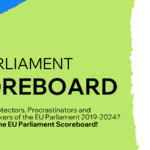In a submission to the public consultation that marks the first step towards the review of the Energy Efficiency Directive (EED), Climate Action Network Europe urges the European Commission to make a pitch for increasing the 2030 energy savings target to 40%. It also advocates for eliminating the accounting tricks written into the Directive, which allow national governments to lower the level of required savings by almost a half.
According to CAN Europe, the global agreement to pursue efforts to limit temperature rise to 1.5°C reached in Paris last year forces the European Commission to recalibrate the EU climate and energy targets for 2030. The review of the Energy Efficiency Directive (EED) due this year is an ideal opportunity to change the weak, indicative target of saving at least 27% of energy by 2030 into a binding 40% one.
“If we don’t want the Paris agreement to become meaningless, we need an immediate overhaul of EU climate and energy policies, including a more ambitious, 40% energy savings target” – Dora Petroula of CAN Europe said. “The Commission’s own studies show that aiming for 40% savings would boost the EU’s energy security, employment and growth much more than the current low target of 27%.”
The EU needs a strong and robust policy framework to deliver energy savings and reap their benefits. The critical Article 7 of the EED, which requires Member States to achieve 1.5% final energy savings every year until 2020, should be extended beyond 2020. Current loopholes that reduce the average savings from 1.5% to only 0.8% have to be corrected.
“The revision is a great opportunity to get rid of loopholes that were written into the Directive. In the wake of the Paris Agreement, Member States should no longer be allowed to outsmart the system and lower the level of energy savings they need to achieve. The European Commission must eliminate the accounting tricks that almost every country in the EU uses to reduce its savings obligations” – Petroula added.
Contact:
Ania Drazkiewicz, CAN Europe Communications Coordinator, ania@caneurope.org, +32 494 525 738
Notes:
[1] Consultation on the Review of Directive 2012/27/EU on Energy Efficiency end on Friday, 29 January 2016. Joint Climate Action Network Europe, European Environment Bureau, Friends of the Earth Europe and WWF Submission here: Final Joint NGOs response on the EED Review consultation
[2] According to the Energy Efficiency Communication Impact Assessment [SWD(2014)255], a level of ambition of 35-40% energy savings in 2030 would reduce the EU’s gas imports by up to 40% compared to 2010, increase GDP by 2.02-4.45% and and create up to 1.5% more new jobs compared to current policies: https://ec.europa.eu/energy/sites/ener/files/documents/2014_eec_ia_adopted_part1_0.pdf
[3] The Coalition for Energy Savings, Implementing the EU Energy Efficiency Directive: Analysis of Article 7 Member States reports, April 2014: http://energycoalition.eu/sites/default/files/20140422%20Coalition%20for%20Energy%20Savings%20Art%207%20Report%20FINAL.pdf
Climate Action Network (CAN) Europe is Europe’s largest coalition working on climate and energy issues. With over 120 member organisations in more than 30 European countries – representing over 44 million citizens – CAN Europe works to prevent dangerous climate change and promote sustainable climate and energy policy in Europe.

